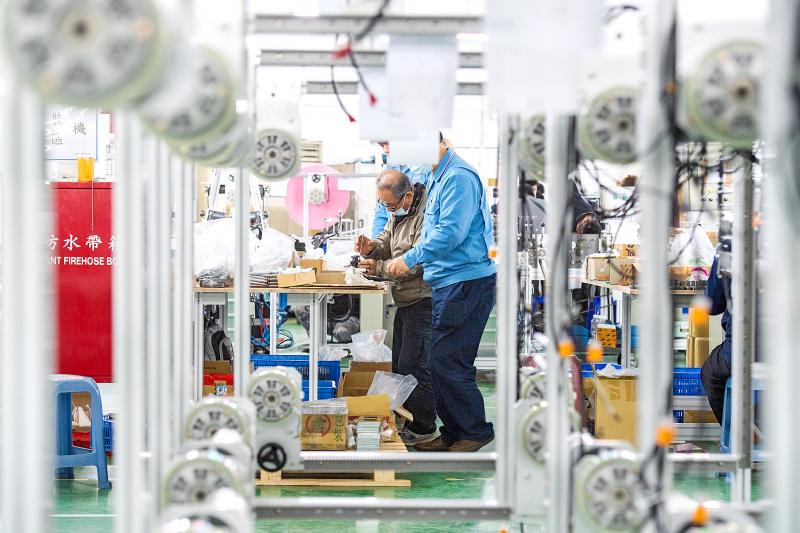The Industrial Technology Research Institute (ITRI, 工研院) has raised its growth forecast for the production value of Taiwan’s manufacturing industry to 10 percent for this year, more than double the estimate of 4.75 percent it made in November last year, as local producers benefit from the robust demand for steel, chips and electronics amid a global economic recovery.
The information and communications technology (ICT) industry would advance by 11.4 percent to NT$8.55 trillion (US$308.6 billion) this year, outpacing its previous estimate of 3.55 percent growth, the institute said in a report released yesterday.
“Strong inventory rebuild demand is adding pressure to an already tight supply of ICT products. Average selling price hikes should help boost the profit margins of local manufacturers,” it said.

Photo: CNA
Shipments of electronics, primarily smartphones, are forecast to increase 9.5 percent this year, compared with its previous forecast of 5.4 percent, driven by work-from-home, online learning and stay-at-home trends.
“Some manufacturers have upgraded equipment or added production lines to cope with the rising demand,” the institute said, adding that a surge in COVID-19 cases and a soft lockdown in Taiwan have not affected the sector, which mainly relies on outbound demand.
The production value of basic metals and machine tools is forecast to rise 10.15 percent to NT$5.67 trillion this year, it said, up from its previous projection of 4.28 percent growth, as China and other countries invest heavily in infrastructure projects to stimulate their economy, boosting steel demand.
The petrochemical industry’s output would grow 12.5 percent to NT$4.2 trillion this year, as an improving global economy pushes up demand for and prices of crude oil and petrochemical products, it said.
However, the production value of the livelihood sector — including restaurants, retail, textile and tourism-related businesses — would feel the pinch of a setback in domestic demand, with the institute predicting its output would grow 1.48 percent to NT$2.5 trillion this year, down from its previous estimate of 2.5 percent growth.
On a more positive note, the apparel and textile industry would post a strong recovery, as companies see increasing orders from global brands, while robust domestic investment would underpin the sector’s growth, it said.

MULTIFACETED: A task force has analyzed possible scenarios and created responses to assist domestic industries in dealing with US tariffs, the economics minister said The Executive Yuan is tomorrow to announce countermeasures to US President Donald Trump’s planned reciprocal tariffs, although the details of the plan would not be made public until Monday next week, Minister of Economic Affairs J.W. Kuo (郭智輝) said yesterday. The Cabinet established an economic and trade task force in November last year to deal with US trade and tariff related issues, Kuo told reporters outside the legislature in Taipei. The task force has been analyzing and evaluating all kinds of scenarios to identify suitable responses and determine how best to assist domestic industries in managing the effects of Trump’s tariffs, he

TIGHT-LIPPED: UMC said it had no merger plans at the moment, after Nikkei Asia reported that the firm and GlobalFoundries were considering restarting merger talks United Microelectronics Corp (UMC, 聯電), the world’s No. 4 contract chipmaker, yesterday launched a new US$5 billion 12-inch chip factory in Singapore as part of its latest effort to diversify its manufacturing footprint amid growing geopolitical risks. The new factory, adjacent to UMC’s existing Singapore fab in the Pasir Res Wafer Fab Park, is scheduled to enter volume production next year, utilizing mature 22-nanometer and 28-nanometer process technologies, UMC said in a statement. The company plans to invest US$5 billion during the first phase of the new fab, which would have an installed capacity of 30,000 12-inch wafers per month, it said. The

Taiwan’s official purchasing managers’ index (PMI) last month rose 0.2 percentage points to 54.2, in a second consecutive month of expansion, thanks to front-loading demand intended to avoid potential US tariff hikes, the Chung-Hua Institution for Economic Research (CIER, 中華經濟研究院) said yesterday. While short-term demand appeared robust, uncertainties rose due to US President Donald Trump’s unpredictable trade policy, CIER president Lien Hsien-ming (連賢明) told a news conference in Taipei. Taiwan’s economy this year would be characterized by high-level fluctuations and the volatility would be wilder than most expect, Lien said Demand for electronics, particularly semiconductors, continues to benefit from US technology giants’ effort

ASML Holding NV, the sole producer of the most advanced machines used in semiconductor manufacturing, said geopolitical tensions are harming innovation a day after US President Donald Trump levied massive tariffs that promise to disrupt trade flows across the entire world. “Our industry has been built basically on the ability of people to work together, to innovate together,” ASML chief executive officer Christophe Fouquet said in a recorded message at a Thursday industry event in the Netherlands. Export controls and increasing geopolitical tensions challenge that collaboration, he said, without specifically addressing the new US tariffs. Tech executives in the EU, which is